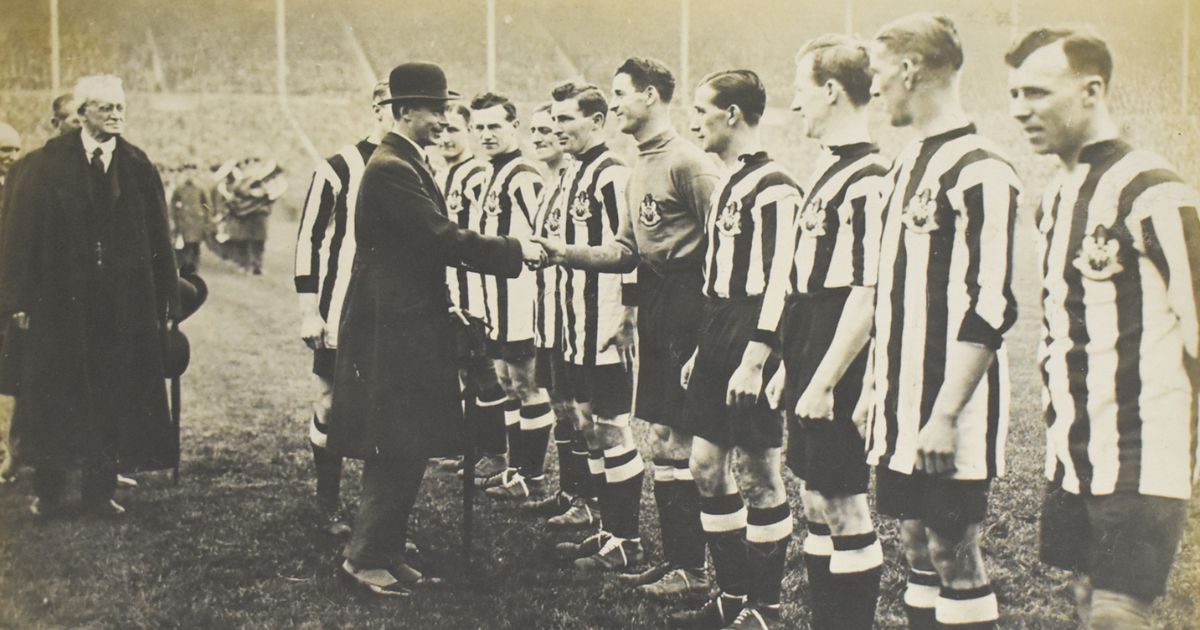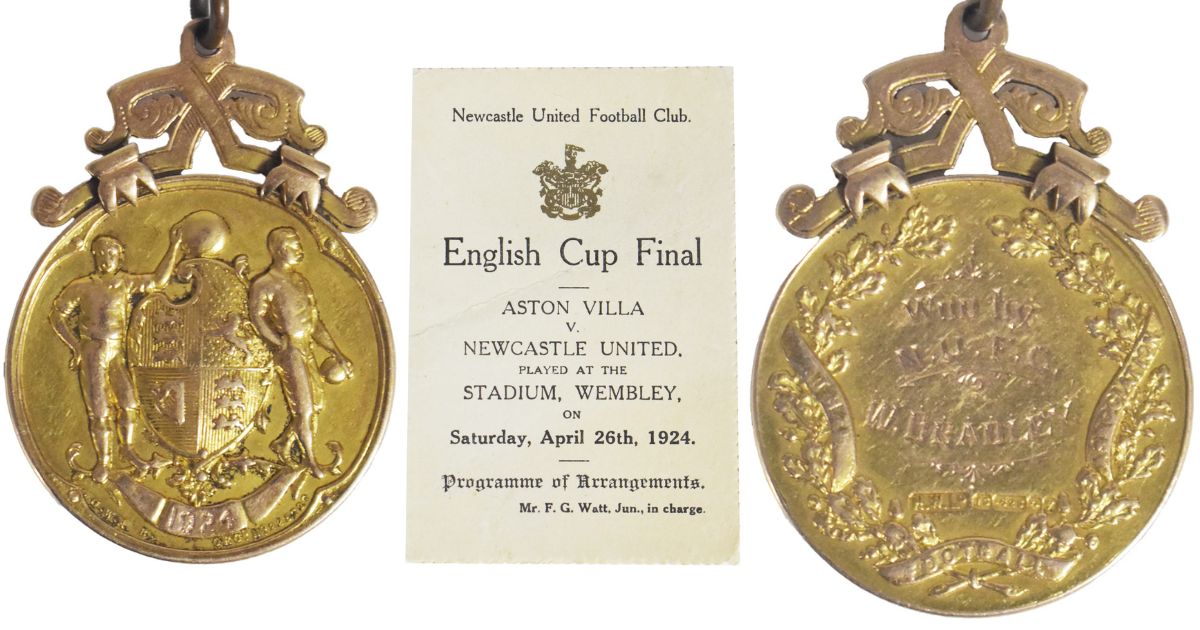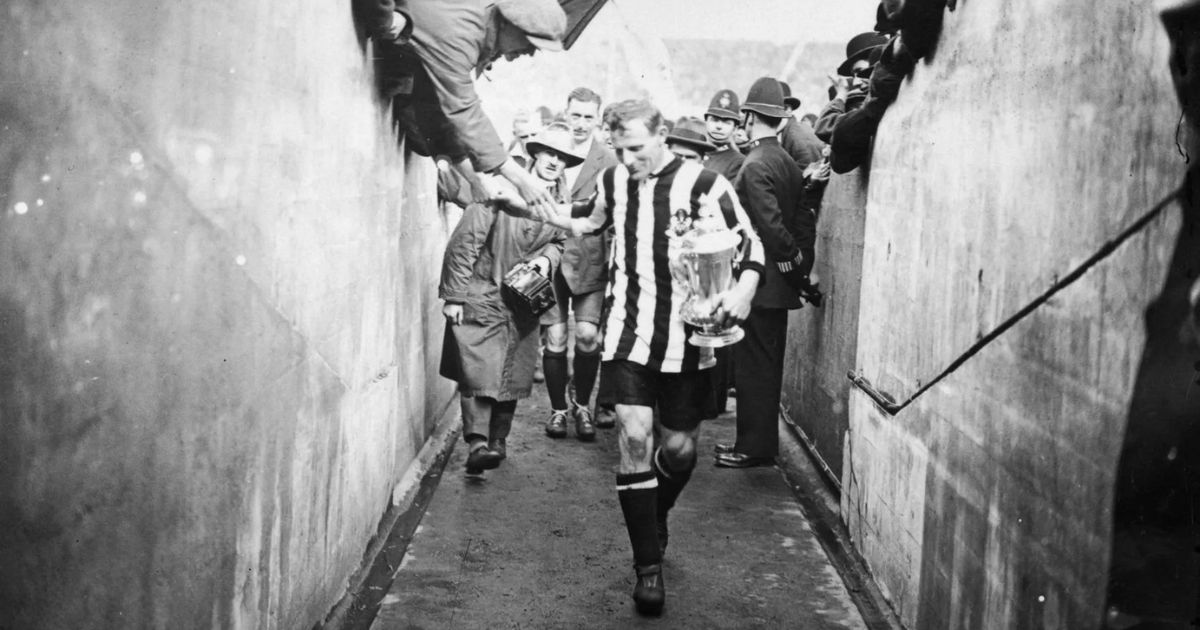
Friday 26 April marks 100 years since Newcastle United won the FA Cup. Beating Aston Villa 2-0 at the Empire Stadium Wembley, which had been open just a year.
Newcastle’s goalkeeper that day was William Bradley. Remarkably he was the club’s No.2 goalkeeper at the time and only received confirmation he would be playing the season’s showpiece fixture on the morning of the game itself.
Fast-forward a few hours, and he was stood on the hallowed turf shaking hands with King George VI (pictured below).

Two years prior to the 1924 final, Newcastle’s legendary goalkeeper Jimmy Lawrence had announced his retirement. To this day he is the club’s record appearance maker, with 507 games for the Magpies.
Rather than hand over the No.1 spot to William Bradley, they drafted in the experienced Sandy Mutch, though Bradley stayed and challenged him and started the 1923/24 season as Newcastle’s first-choice keeper.
“He lost his place in the January, which was a bit unlucky” explains Newcastle United’s Club Historian Paul Joannou. “I think he played in the first game of that FA Cup run, then Mutch took over.”
On the eve of the cup final, Newcastle and Aston Villa met in the league in a dress rehearsal for the final itself. Newcastle’s selection committee decided to rest all their players, apart from goalkeeper Sandy Mutch. Guess what happened next...

“Of course, Sandy Mutch was injured and struggled over the next few days. He tried and tried, and it was really at the last moment, the morning of the match that Sandy dropped out, and Bill Bradley was called up. The local lad from Wardley in Gateshead turned out at Wembley.
“He played the proverbial blinder. He made a number of, what was described in the press as, incredible saves to keep Newcastle in the game. Newcastle didn't score their two goals until late in the game, 83 minutes and 86 minutes, so really Bradley kept Newcastle in the game, along with the goalscorers was man of the match.”
Bradley had just turned 31, he had served as a gunner in the Royal Garrison Artillery in World War I which had robbed him of half his career.
“He played for two or three more seasons then settled down in North Shields, later becoming a well-known newsagent in that area. The 1924 final was the first of five wins in a row at what is now regarded as the ‘old Wembley’, after that we've never won another there.”

Bradley was of course awarded a winners’ medal at full-time, and a commemorative pocket watch which was engraved. Both items are included in a lot which is set to be auctioned on 13 June along with the original programme of arrangements, a WW1 football medal and paper cuttings including a picture of Bradley shaking hands with King George VI (then The Duke of York) after the game.
The medal has been consigned directly from William Bradley’s family who are ready to pass it on to public hands. Bradley’s grandson said: “My grandfather passed away before I had the chance to meet him, but his legend as a cup hero and local celebrity was a constant presence in my upbringing.
“Now, as I prepare to sell the medal that has been tucked away since I inherited it, I feel it's time to share it with the world, especially in this centenary year. Hearing from my father about how football kept my grandfather largely out of the horrors of WW1, with the army utilising him for morale-boosting exhibition matches, adds another layer of complexity to his story.”
The lot is estimated to sell for between £5,000 and £7,000 in Anderson & Garland’s Collectors’ who are based in the North East. Fred Wyrley-Birch, Director at Anderson & Garland said: “FA Cup medals are rare to come onto the market, Anderson and Garland have sold the medals of two of Bradley’s contemporaries, Frank George Watts, Club Secretary, and Robert William Mackenzie, Club Director, each selling for many thousands of pounds.”
More Newcastle United stories
'I got what I wanted': Anthony Gordon reveals all on his decision to leave boyhood club Everton
Why are Newcastle United’s local heroes are often ‘held to a higher standard’ by certain sections of their fan base
Newcastle United’s reported pursuit of ‘next Zlatan Ibrahimovic’ and what it may mean for Alexander Isak







